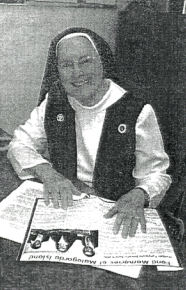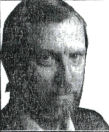| |
Sister Perpetua has seen some storms, but says the one in 1942 on this day was the worst that she ever experienced.
She was Mary Bertha Hawes, daughter of Alfred Edwin and Josephine "Phenie" Johnson Hawes of Port O'Connor and Matagorda Island, and was preparing to return to her studies at Incarnate Word College in San Antonio when the storm blew in. The hurricane had formed near Grand Cayman Island on August 26, and by the time it made landfall on Matagorda Bay on the 30th, it had winds of 110 miles per hour and a 14.7-foot storm surge. With her mother, dad and an aunt who was dying of cancer, she says they tried to escape the storm by going to Victoria and Tivoli, but could find no place to stay. Edwin and Josephine "Phenie" Johnson Hawes of Port O'Connor and Matagorda Island, and was preparing to return to her studies at Incarnate Word College in San Antonio when the storm blew in. The hurricane had formed near Grand Cayman Island on August 26, and by the time it made landfall on Matagorda Bay on the 30th, it had winds of 110 miles per hour and a 14.7-foot storm surge. With her mother, dad and an aunt who was dying of cancer, she says they tried to escape the storm by going to Victoria and Tivoli, but could find no place to stay.
"It looked like it had passed," she recalls, "so we returned to Port O'Connor."
They would take refuge in the home of some relatives who lived a bit away from the bay where some 30 people had gathered.
"Just before midnight," she recalls, "the whole house was lifted ..off its blocks and shifted. The cement pilings began coming through the floor."
Sister Perpetua remembers looking out a window and seeing waves even with the sill.
"We knew we couldn't get out," she says. "Water began coming in. Believe me, we began to pray." Just before midnight, the big glass doors began to heave in from the pressure of the water and the men had to nail a large beam across them.
"Then, we looked out and the whole sky was orange toward the southeast," she says. "Dad said he thought the world was coming to an end."
The next morning her brother Hugh went to check on their home closer to the bay and found it was gone.
"It had burned during the storm," she says, "and everything was swept away."
What was left of their furnishings was scattered for at least a half-mile from- the bay and the family's sheep had drowned and were wrapped up
in a white picket fence.
"All we had left was the clothes on our backs," she says.
While Hurricane Carla in 1961 was a stronger storm, Sister Perpetua was at Nazareth Academy
in Victoria at the time. She taught at Nazareth Academy for 25 years and was Mother Superior from 1970 to 1976 at Incarnate Word Convent and again from 1982 to 1988.
|
|
 |
Henry's
Journal
|
|
|
Henry
Wolff Jr.
|
She is presently director of religious education at Our Lady of the Gulf Catholic Church in Port Lavaca.
Her mother had lost a home during Carla as she had in 1942 and 1919.
"Dad had some Negro cowboys in tents in 1919," she recalls. "They looked up and said the water is coming. Mother took her first born, my brother Pat, who was just 3 months old, and went to the O'Connor house up the street and just as she got there the water was about to pull them under. "Edgar Munsch, who resided on the property, reached out and grabbed the baby and helped mother. She always credited Edgar with saving her baby's life.
Her mother remembered how they had lost 1,300 sheep on Matagorda Island. The family was longtime sheep and cattle ranchers on the island, going back to when the first family members settled there in 1853. "My parents were the last of the Hawes to maintain a home on the island," she notes. That was until the family lands were taken over by the government for military use during World War II. During a storm in 1865 when Sister Perpetua's grandmother, the junior Hugh Walker Hawes' wife, Mary Ann Collins, was a little girl on the island, her family had gone up into the sand dunes for protection from the water. "When they went to sleep," she says, "rattlesnakes wrapped around the children's arms. They flung them off, thank God no one was bitten." The first storm that Sister Perpetua remembers was in 1929 when she was 5 years old. "Grandfather Hugh Walker Hawes, Jr. died right after the storm," she recalls. The church was destroyed in Port O'Connor and they had to bring the body to Port Lavaca to the Oblate Villa, a Catholic home for seminarians, for the funeral mass. "Before he died, he was taken from our home near the water to Lollie Mundt's house, a cousin, because it was safer," Sister Perpetua says. She recalls that both of the houses had trap doors that could
be opened to let the water drain out after a storm. Among other storms of one sort or another, Sister Perpetua remembers one in 1932 when her mother was hospitalized in Houston with typhoid and they were staying with an aunt in Freeport. "We went to Angleton to a family who had a storm cellar," she says. Not all her storm memories are bad, like times when her family would come to Victoria and she would get to see an indoor movie. "Not just the tent movies that came to Port O'Connor," she says. Storms could be fun for children, while a matter for worrying and waiting was left for the adults.
|
|